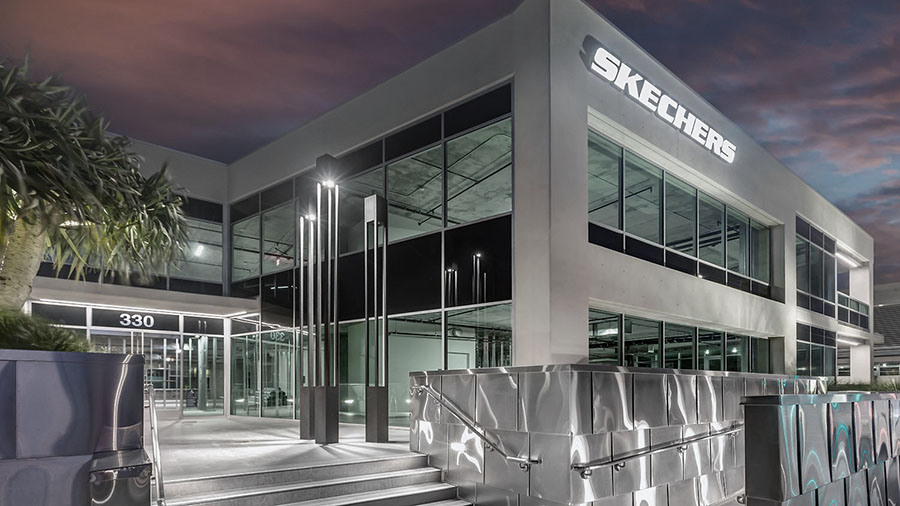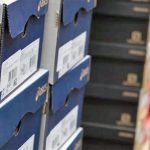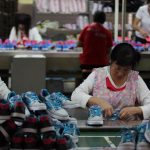Amid significant uncertainty in the marketplace caused by President Trump’s trade war, Skechers USA agreed to be acquired by private equity firm 3G Capital for $9.4 billion in a move that will end its 26-year run in the public markets.
The announcement follows a decision by Skechers not to offer full-year guidance in April due to trade uncertainties with shoe companies highly exposed to President Trump’s tariffs.
3G Capital agreed to pay $63 per share, a 27.6 percent increase over Friday, May 2, closing price of $49.37, and a premium of 30 percent to the company’s 15-day volume-weighted average stock price.
Shares of Skechers (SKX) were up nearly 25 percent in mid-day trading on Monday, May 5, 2025, in reaction to the company’s acquisition news.
Skechers will continue to be led by Chairman and CEO Robert Greenberg, President Michael Greenberg and Chief Operating Officer David Weinberg and “remain focused on its successful strategy of delivering style, comfort, quality, and innovation at an affordable price.”
In its statement, the company said Skechers and 3G Capital have a “shared vision for the long-term future growth of the business.”
Robert Greenberg, who founded LA Gear in 1983, stepped down from the company as CEO in 1992, the same year he co-founded Skechers with his son, Michael. Skechers went public in 1999.
The shoe company, known for its affordable casual footwear options and recent hit with hands-free slip-ins, has become the third-largest footwear brand worldwide, behind Nike and Adidas.
Skechers reported a record $9 billion in revenue in 2024, with net earnings of $640 million.
“Over the last three decades, Skechers has experienced tremendous growth,” said the senior Greenberg in a statement. “Our success has been due to our commitment to excellence and innovation across the entire Skechers organization, in-demand comfort-focused product offering, and loyal partners. With a proven track record, Skechers is entering its next chapter in partnership with the global investment firm 3G Capital. Given their remarkable history of facilitating the success of some of the most iconic global consumer businesses, we believe this partnership will support our talented team as they execute their expertise to meet the needs of our consumers and customers while enabling the company’s long-term growth.”
3G Capital, co-founded by Brazilian billionaire Jorge Paulo Lemann, has a history in the consumer-goods sector, playing a significant role in engineering the merger of Kraft Foods and Heinz and forming Anheuser-Busch InBev. 3G Capital acquired Burger King Holdings in 2010 and later added Tim Hortons and Popeyes to establish Restaurant Brands International.
The Brazilian private equity firm is known for its “zero-based budgeting” approach that focuses attention on expenses and challenges existing costs.
Alex Behring, co-founder and co-managing partner, and Daniel Schwartz, co-managing partner, of 3G Capital, stated, “We are thrilled to be partnering with Skechers and look forward to working with an entrepreneur of Robert’s caliber and the talented Skechers team. Skechers is an iconic, founder-led brand with a track record of creativity and innovation. We have immense admiration for the business that this team has built, and look forward to supporting the Company’s next chapter. Our team at 3G Capital is built to partner with companies like Skechers.”
The Tariff Question
Speaking anonymously, a source close to the deal told CNBC that the trade environment did not force Skechers into the agreement as 3G Capital had been interested in acquiring the company for years. The source also noted that while 3G Capital recognizes the near-term risks from tariffs, it believes Skechers’ long-term growth outlook remains attractive. Nonethless, Skechers shares tumbled from around $75 in January to below $50 recently after it withdrew financial guidance for the year in April, citing “macroeconomic uncertainty stemming from global trade policies.”
Along with other footwear makers, including Nike, Skechers is exposed to tariffs on U.S. imports and trade disputes, with about 40 percent of Skechers’ products manufactured in China. Trump has placed a 145 percent tax on goods imported from the country. Another 40 percent of Skechers products are produced in Vietnam, which has received significant tariff threats from the Trump administration.
Skechers’ CFO John Vandemore said in April on Skechers’ first-quarter analyst call that the “current environment is simply too dynamic from which to plan results with a reasonable assurance of success.”
Skechers executives indicated then that they would look to minimize products imported to the U.S. from “high-cost locations,” including due to the impact of tariffs. They also cited several “levers” the company could pull to deal with tariffs, including cost sharing with vendors, sourcing optimization and price adjustments.
“We’re looking at how we optimize the global cost of tariffs in all markets when we look to move production around,” Vandemore said last month. “Obviously, with an effective tariff rate at about 159 percent, products from China to the U.S. are prohibitively expensive.”
“Skechers has ~40 percent goods sourced from China, the highest amount in the [Stifel] Sports & Lifestyle Brands group,“ Duffy added in his Monday, May 5, note. “The geographic diversity of revenue (62 percent revenue from outside U.S.) represents a structural advantage in mitigating tariff risk.”
Last week, Skechers, Nike, Under Armour, and other sneaker giants signed a letter from the Footwear Distributors and Retailers of America (FDRA) trade group urging President Trump to exempt the footwear industry from tariffs. The companies warned that the import taxes could “wipe out hundreds of businesses, kill tens of thousands of jobs and raise prices for consumers.”
Why Now, Then?
Sam Poser, equity analyst at Willams Trading, LLC, provided a take on the “why now“ question for the deal.
“We believe that CEO Robert Greenberg, who is 84 years old, controls ~60 percent of SKX voting shares, was likely planning to retire next year, and decided that all the noise around tariffs, the macro outlook and having to continue to navigate the public markets was more than enough to sell the company,“ Poser offered in a Monday, May 5, note to investors.
“Robert Greenberg and his team will continue to run the company post the acquisition. We also believe that a strategic acquirer was not a possibility, as Mr. Greenberg would not be willing to report to another operator, and without Robert, as the visionary, a strategic would not pay a premium for the company,” continued Poser.
Matt Powell, a veteran footwear industry advisor and founder of Spurwink River, a retail consulting firm, likewise believes that Robert Greenberg, given his age, “may have decided to cash out now.“
Powell is uncertain how the acquisition could impact Skechers’ business. “Private equity always believes it can cut expense and raise prices and throw off greater profits. It doesn’t always work,“ he said.
However, Powell also said he wouldn’t be surprised to see smaller brands acquired at the current bargain prices being fetched on the stock market. “There is a lot of PE money on the sidelines,“ he offered.
Valuation Frustration?
The Wall Street Journal also noted that Skechers’ management was frustrated with the valuation of Skechers shares on the public market, with valuations well below Deckers Brands, the parent of Hoka and Ugg, and On Holding, despite significantly higher sales.
Skechers believes Deckers and On have benefited from the company’s positioning around more aspirational athletic footwear offerings. Deckers Brands has a market capitalization of about $18 billion, while On Holding is about $16 billion.
While Skechers has invested in making performance footwear, including signing NBA All-Star Joel Embiid, Bayern Munich, and striker Harry Kane, and a significant investment in the pickleball trend, it’s still known for its casual offerings.
The Wall Street Journal noted that COO Weinberg said in an interview in January 2025, “The growth numbers are there, and all the financial people have seen it. They just don’t know how to put it together to a size and scale that it can become.”
At TD Cowen, John Kernan believes the $9.4 billion deal is the largest in softline retail sector history. He noted that the most recent deal was Reebok, sold for $2.5 billion, or 1.1 times sales. He calculated that the Skechers’ purchase represented about 0.8 times EV (enterprise value)/sales.
Kernan wrote in a note, “This highlights opportunistic investing in the sector during a time of uncertainty, with sector valuation multiples near five-year lows.”
Kernan also suspects Skechers may eventually return to the stock market, writing, “3G’s playbook of boosting margins through cost-cutting and efficiencies certainly creates the likelihood that we will see Skechers come public again in the distant future.”
Jim Duffy, managing director and analyst at Stifel Financial Corp., said the Skechers’ deal shows that a similar takeout opportunity may develop for other footwear firms, seeing their stocks creep near lows amid market uncertainty. Duffy wrote, “The appetite for a strong franchise with a long track record for growth and runway for continued reinvestment encourages the valuation for other tariff-impacted franchises trading below their intrinsic value.”
Duffy showed that his crystal ball is fully operational as he had the SKX Price Target (PT) pegged at $62 per share, a buck shy of the 3G offer. Stifel downgraded guidance to HOLD from the previous BUY rating.
Given the deal’s size and scope and uncertainty level in modeling cash flow over the next several years, Kernan does not expect another bidder to come to market. Greenberg’s family ownership of 57 percent of the voting rights is also expected to preclude other bids.
Skechers said its Board formed an independent committee of independent directors to evaluate the transaction. The independent committee reviewed, negotiated, unanimously approved, and recommended the transaction for approval by the Skechers Board.
Following Board approval, Skechers’ stockholders hold approximately 60 percent of the combined voting power of the outstanding shares of Skechers’ stock and approved the transaction by written consent. As a result, no further actions by other Skechers stockholders are needed to approve the transaction.
The transaction includes the option for existing shareholders of Skechers to instead receive $57.00 in cash and one unlisted, non-transferable equity unit in a newly-formed, privately held company that, following the transaction’s closing, will be the parent company of Skechers. 3G Capital is expected to hold approximately 80 percent of the new LLC’s outstanding units immediately following the transaction’s closing.
In connection with the merger agreement, Robert Greenberg and other members of the Greenberg family also have the option to receive the LLC’s outstanding units. The Greenberg family is expected to take the second option for as many shares as possible, a person familiar with the matter told the Wall Street Journal.
The transaction will be financed through a combination of cash provided by 3G Capital and debt financing that has been committed by JPMorgan Chase Bank, N.A. Subject to the satisfaction of customary closing conditions, including receipt of regulatory approvals, the acquisition is expected to close in the third quarter.
Skechers will remain headquartered in Manhattan Beach, CA, where it was founded over 30 years ago.
Image courtesy Skechers
















